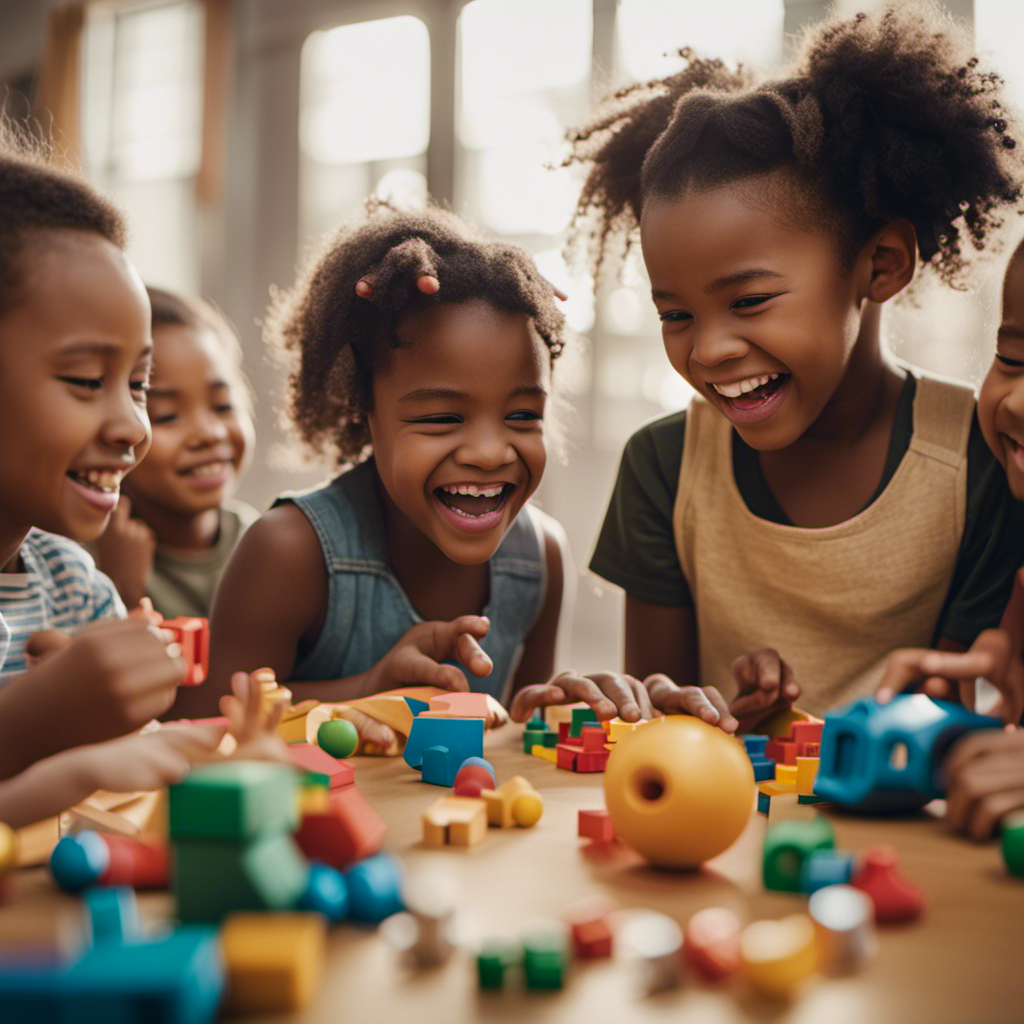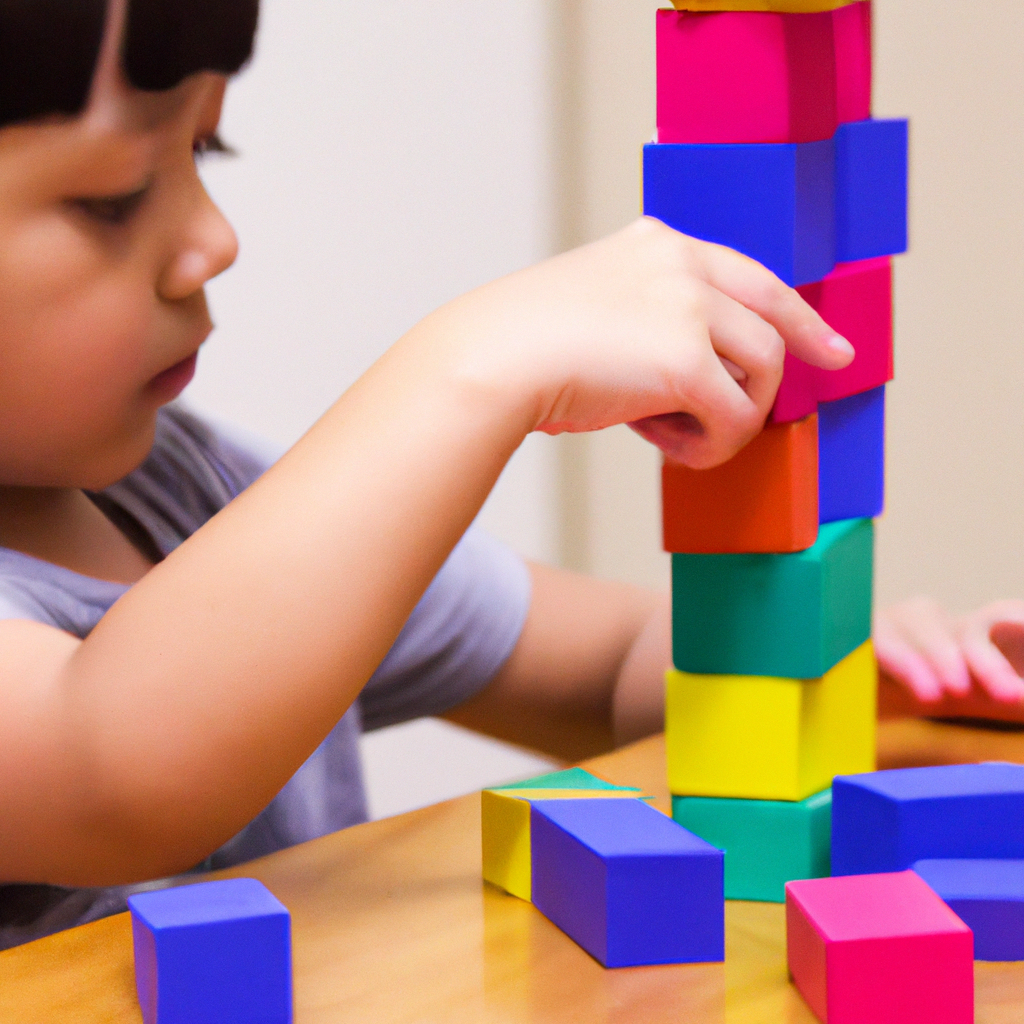Understanding your child’s developmental milestones can be made easier through play. By observing how they manipulate toys, jump, or use new words, you gain insight into their growth in language and motor skills. Play also offers clues about their social and emotional development. Tracking these milestones helps you support their progress effectively. Keep exploring, and you’ll discover how play reveals their emerging abilities in a natural, engaging way.
Key Takeaways
- Play reflects children’s current skills, providing insight into developmental milestones in language and motor abilities.
- Observing play behaviors helps identify progress in fine and gross motor skills.
- Language development is evident as children experiment with words, sentences, and social interactions during play.
- Consistent play activities support skill refinement and track growth over time.
- Play-based observation offers a natural, engaging way to assess and support a child’s developmental progress.

Play is a powerful tool for understanding how children develop, as it reflects their growing skills and abilities. When you observe children at play, you can gain valuable insights into their progress in areas like language development and motor skills. Play isn’t just about fun; it’s a window into their developmental milestones. For example, as children experiment with new words during pretend play or storytime, you see their language skills expanding. They might begin by repeating simple words or phrases and gradually start forming sentences. Noticing these changes helps you understand where they are in their language development journey. Similarly, the way children manipulate toys, run, jump, or climb reveals their motor skills. Fine motor skills like grasping small objects or stacking blocks develop alongside gross motor skills such as balancing, crawling, or riding a tricycle. Watching how they handle different toys or navigate their environment provides clues about their physical growth.
By engaging in play, children practice and refine these skills naturally. When you see a child reaching for a puzzle piece, grasping a crayon, or threading beads, you’re witnessing their fine motor skills in action. These activities involve hand-eye coordination, dexterity, and muscle control, which are essential for everyday tasks. Gross motor skills are evident when children run, hop, or throw balls during playtime. These movements not only demonstrate their physical capabilities but also their confidence and coordination levels. As you observe, you might notice progress over time—perhaps a child who initially struggles to stack blocks now builds towers taller than themselves or a toddler who previously couldn’t walk steadily now runs with ease. Additionally, understanding cybersecurity vulnerabilities during digital play environments helps caregivers ensure safe interactions online.
Play also enhances language development because children often narrate their actions or ask questions during play. For instance, a child playing with a doctor kit might describe what they’re doing or respond to your prompts, showing their expanding vocabulary and comprehension. This interactive aspect of play helps solidify new words and concepts, making learning engaging and meaningful. Additionally, play encourages social and emotional development, which in turn supports language use in social contexts. When children cooperate, negotiate, or share during play, they practice communication skills essential for their overall development.
In essence, observing children during play allows you to track their milestones in language and motor skills naturally. It’s a dynamic, informative process that helps you understand their growth and provides opportunities to support their ongoing development through fun, purposeful activities.
Frequently Asked Questions
How Can Parents Support Children With Developmental Delays Through Play?
You can support children with developmental delays through play by focusing on activities that promote sensory integration and fine motor skills. Engage them in hands-on tasks like finger painting, building with blocks, or playing with textured toys. These activities help enhance coordination and sensory processing. By providing a variety of stimulating play options, you encourage their growth and boost confidence in their abilities, making learning both fun and beneficial.
What Types of Play Are Best for Promoting Specific Developmental Skills?
You can promote specific developmental skills through targeted play. Sensory play helps enhance fine motor skills and sensory processing, while constructive activities like building blocks boost problem-solving and spatial awareness. By engaging your child in these activities, you encourage growth in key areas. Incorporate a variety of sensory experiences and constructive tasks into playtime to support your child’s developmental progress effectively and enjoyably.
How Do Cultural Differences Influence Developmental Milestones and Play?
Cultural differences shape developmental milestones like a garden influences its blooms. You’ll find that cultural play norms vary widely, affecting how children learn and grow. By engaging in cross-cultural learning, you see how different play styles support unique developmental skills. These variations encourage children to develop social, emotional, and cognitive abilities in ways that reflect their cultural context, helping them thrive in diverse environments and fostering mutual understanding.
When Should Parents Seek Professional Advice for Developmental Concerns?
If you’re worried about your child’s development, don’t hesitate to seek professional advice. Early intervention and developmental screening are essential if your child misses key milestones or shows signs of delays. Trust your instincts and consult a pediatrician if you notice persistent concerns with communication, motor skills, or social behaviors. The sooner you act, the better your child’s chances for support and growth.
How Does Play Impact Emotional and Social Development Alongside Physical Skills?
Play is the bridge that connects your child’s emotional and social worlds, much like a gardener nurturing a garden. It fosters emotional bonding, helping your child feel safe and loved, while also developing social skills like sharing and cooperation. Through play, your child learns to navigate feelings and build relationships, laying a strong foundation for future emotional resilience and social confidence. Active play is essential for holistic growth.
Conclusion
So, while you might think play is just fun, it’s actually the secret code to your child’s growth. Ironically, the very activities that seem simple are revealing their biggest developmental leaps. Pay close attention during playtime—those giggles and games are more than just entertainment; they’re milestones in disguise. Who knew that your child’s greatest progress happens when you’re just having fun together? Keep playing, because that’s how they truly grow.









